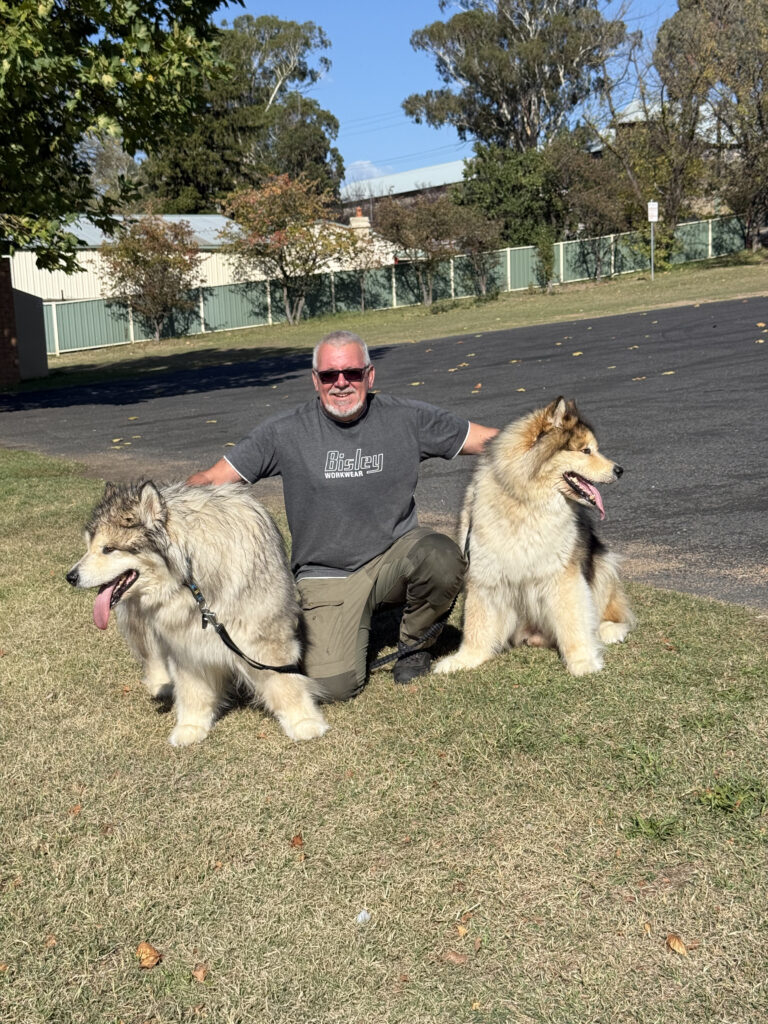Dog Behaviourist And Dog Trainer
Training a dog with behavioural problems is quite an easy process to take on, only when you know what you are doing. And most importantly is, is how to correctly approach and correct misbehaviours, reprimand and praising when required.
When you have the knowledge, background and correct educational tools, coupled with many years of studying wild and domesticated dogs, and with my 39 years experience working with dog behavioural issues, I have developed the perfected training methods down to the finest details and requirement for them to properly respond and understand us.
Dogs will do anything we want them to do on command with the correct approach. Once your dog learns your humanised behaviour and interaction with him, they will become confused, anxious, misbehave and can develop anxieties of many variables. Here you find that your fido does not respond to you because we do not understand them and they do not understand us.
It is very easy and simple to correct those learnt behaviours or displayed symptoms if you know how to appropriately approach the situation. And I am going to show you how quick and easy it is to change a dogs behavioural problem within a session or two, and sometimes within minutes.
We do not punish or shout at our trainee dogs, we use Force Free training methods which resemble their natural learning from their biological parents.
We actually communicate with them silently and very gently, and in the same language and approach their parents would communicate with them to gain that Trust, Bond and Respect for ultimate and obedience, good mannerisms and constant effective control with good development of their social skills.
Reward Based (Positive Reinforcement) Training OR Respect Based Training
The question of Reward based or Respect based training has always been a debate amongst many professional dog trainers, and dog training organisations.
On the other hand, Cause For Paws training guidelines are based on proven researched facts which show that dogs that have been trained on their natural respect training program are better listeners and more obedient with better social skill.
🐾 Dog Training and Dog Behaviourist – Canberra
Training your dog is an essential responsibility for every domestic dog owner. In this article, I’ll aim to keep things clear and concise—yet informative and helpful.
Indeed, it’s vital that dog owners understand what type of training best suits their dog’s breed, temperament, and their own goals. Far too often, people are convinced to spend money on training programs that are either ineffective or inappropriate. In many cases, this leads to worsened behaviour and frustration.
🐶 Why Start Dog Training Early?
At Cause for Paws, we strongly advocate starting training from the earliest puppy stages.
For example, imagine walking your dog through an off-leash park. Suddenly, your dog spots a possum or cat across the road. If your dog was trained solely with a reward-based method, no matter how big the steak in your hand is, your dog will likely ignore you and lunge forward—completely tuning out your commands.
This isn’t speculation—it’s a scenario many dog owners have experienced firsthand.
🧭 Respect-Based Dog Training
Now, let’s contrast that. A dog trained through Respect-Based Training in the same situation will stop immediately at your command—“STAY”—and remain by your side, awaiting further instruction such as “FREE.” All this without bribery or treats.
Just think about the pack leader in the wild. Does he hand out treats when his pack follows him? No. He leads through strength, consistency, and calm authority. Pack animals respect their leader because he offers stability, protection, and trust—not snacks.
Respect in dogs is achieved through body language, eye contact, energy, and bonding—not yelling, hitting, or coercion.

Respect is a learned behaviour in the wild. With the right trainer—someone familiar with these natural behaviours—this can be cultivated through positive, humane techniques. Resorting to punishment only breeds fear and resentment, not respect or obedience.
👥 Humanising Dogs: A Common Mistake
One major issue many owners face is unknowingly humanising their dogs. We often project human emotions onto them—like guilt, shame, or empathy. This causes confusion and can lead to various forms of anxiety.
The truth is, dogs don’t hold grudges or feel remorse over toys or food. They are primal beings, guided by instinct, behaviour, and physical needs. While they’ve been domesticated for over 11,000 years, they haven’t fundamentally changed in their social or behavioural structures.
🎯 Reward-Based Training: When It Works
Now, I’m not saying Reward-Based Training doesn’t work—it absolutely has its place. We use it ourselves at Cause for Paws, especially with:
Performing dogs
Detection dogs (e.g., narcotics or explosives)
Puppies in early stages of learning
However, in my experience, dogs trained through Respect-Based Training consistently follow commands—often 99% of the time—and are still rewarded afterwards with affection, toys, or food.
Importantly, this doesn’t involve harsh treatment. On the contrary, respect-trained dogs respond best to calm, assertive leadership.
🚨 Don’t Miss It – Canberra & Snowy Monaro Region
If you’re considering training to correct barking, aggression, or other behaviours, many factors must be considered:
Breed purpose (e.g., hunting, guarding, companionship)
Intelligence level
Energy level
Daily environment and interactions
Different dogs require tailored methods. Sadly, not every trainer has the skills or knowledge to provide this.
📚 Respect-Based Training Is Earned
Respect-Based Training takes years of hands-on experience, observation, and study. Unfortunately, many trainers fall back on harmful tools like choke chains and electronic collars. These methods are not only cruel but also ineffective long-term.
As soon as the collar comes off, the bad behaviours return. The pack leader in the wild doesn’t need such devices—he has trust, leadership, and connection.
Worse still are the many stories of people spending thousands on “trainers” and “behaviourists” with no results. Perhaps you’ve heard a few of those stories yourself.
❤️ Why I Do This
I love dogs. I’ve lived and worked with them all my life. I respect them, their instincts, and their way of communicating. That’s why I will never advocate physical punishment or abuse. It doesn’t work—and it destroys the relationship.
Instead, it’s all about respect. If you learn how to earn your dog’s respect—in their language—you’ll have their full attention… every time. (Except, maybe, when they’re rolling in a mud puddle!)
📝 Ask Yourself These Two Questions:
Before you choose a training method or program, reflect on these:
What exactly do you want your dog to do—or stop doing?
Is your dog’s breed appropriate for your family’s lifestyle and energy level?
🐕 Final Thoughts – Dog Training and Dog Behaviourist in Canberra
To me, a well-trained dog isn’t one that shakes paws for a treat. It’s the dog that looks into my eyes and waits for permission to run, play, or enjoy that delicious steak.
So, if you want your dog’s full attention—regardless of the distractions around—reach out to Cause for Paws today for a professional dog training assessment.
👉 Contact Us Now!
Our Dog Training Service areas include the following areas: Dog Training and Dog Behaviour Modification In Canberra and Snowy Monaro Region.
Follow this link to Ian Dubar’s Website for more useful information







